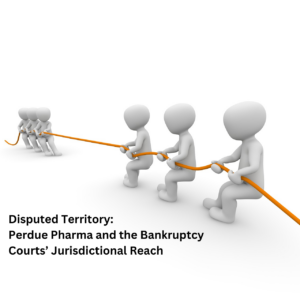Disputed Territory

The United States Supreme Court recently heard oral arguments about the Purdue Pharma bankruptcy case. That, in itself, is not terribly unusual. Since bankruptcy is Federal Law, the US Supreme Court is the natural and appropriate endpoint for all bankruptcy disputes. On average, the US Supreme Court hears about one bankruptcy matter per term.
In this case, the question before the court is whether terms beneficial to the Sackler family could be included in the Purdue Pharma bankruptcy settlement. The government argued that no, if the Sacklers want protection from the bankruptcy courts, then they should file bankruptcy themselves. Purdue Pharma (indeed, the vast majority of creditors involved in the case) disagreed. The legal term for this is a “non-consensual third-party release.” The Purdue Pharma case is certainly not the first one to include such a third-party release for its owners and officers, but it is the first time that the question has been taken up by the highest court.
It’s tempting to think of bankruptcy in simplistic terms: debtor v. creditor, business v. consumer, liquidating v. reorganization. And if you tend to find yourself on one particular side of the “v” in the bankruptcy cases in which you participate, it is easy to simply line up on the side of your typical constituency and cheer.
Some bankruptcy disputes are not so much about one usual constituency versus its usual rival, but about the limits of bankruptcy itself. Some disputes are not between parties so much as definitional battles about what bankruptcy courts have the right and authority even to do at all. These are, in other words, territorial disputes. The size and shape of the bankruptcy courts’ jurisdictional reach are up for debate in the Purdue Pharma case. The government says its territory is one size; the Debtor says it is bigger.
The Purdue Pharma case is less about increasing a certain set of benefits to Debtors in bankruptcy cases (which, as a Debtors’ attorney, I would wholeheartedly cheer) and more one of increasing the boundaries of bankruptcy’s territory, generally – something that is a far more complicated question.
There are always unintended consequences when the territorial lines are expanded. Sometimes, there are landmines in those areas. After all, what is used in one case for the benefit of a Debtor will almost certainly be used in another case for the benefit of a creditor.
- About the Author
- Latest Posts
For more than 20 years, the Sasser Law Firm has been helping individuals and business owners sort through financial hardships to see the light at the end of the tunnel. Our North Carolina bankruptcy attorneys are all board-certified specialists, which means we have passed a complex exam, undergone a thorough peer review, and continue to earn legal education credits in this ever-evolving area of law.














